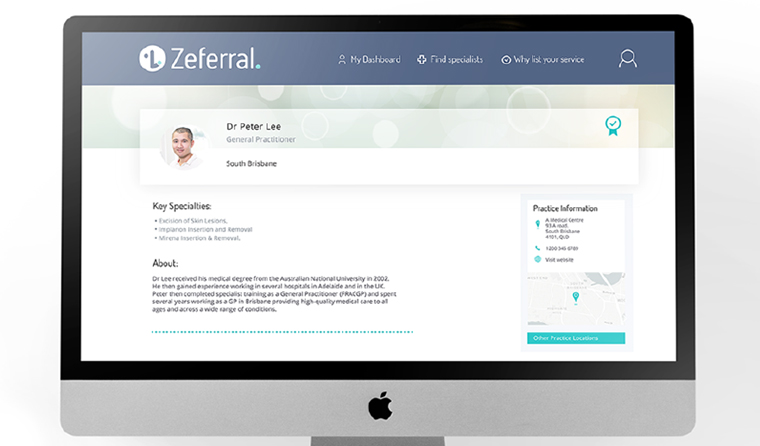Feature
A GP’s journey in technology development
A shock diagnosis and a move across the world inspired Dr Naomi Zeraati to create a service she hopes will help GPs, specialists and patients.
 Dr Naomi Zeraati hopes her online tool can benefit GPs, specialists and patients by facilitating better and more timely referrals.
Dr Naomi Zeraati hopes her online tool can benefit GPs, specialists and patients by facilitating better and more timely referrals.
It was two years ago Dr Naomi Zeraati heard the news that spurred her to create Zeferral, an online tool designed to help GPs make timely referrals to the most appropriate specialist for their patients.
‘It was around November 2017, that was when my brother was diagnosed with metastatic testicular cancer,’ Dr Naomi Zeraati told newsGP.
‘He was only 24.’
‘It was quite a horrible, scary time, and it was the first time I’ve been in the patient’s perspective, feeling helpless and anxious and just wanting to find the best specialist for him.
‘And so that was my main driver.’
The second big driver came from Dr Zeraati’s experience in moving to Australia from the UK, being asked for referrals in a country with which she was not yet completely familiar.
‘I came from the other side of the world, and in my first week I was getting a lot of requests like, “Can you recommend an orthopaedic surgeon for this hip replacement”, and I’m thinking, I don’t know,’ she said.
And from what she saw on social media, Dr Zeraati was not the only GP experiencing this difficulty.
‘I think a lot of patients just assume we, as GPs, all know who the best specialist is and that all [medical professionals] know each other,’ she said.
‘But often on Facebook groups, I see GPs asking other GPs for recommendations for their patients.’
Dr Zeraati found that even receiving a helpful suggestion would not always spell the end of the search.
‘Sometimes the information about the practices isn’t always up to date, or the doctor has retired,’ she said.
‘So we send a referral and a week later the patient will return saying that the doctor is not available or is not there anymore. So it’s just quite inefficient, the process at the moment.’
These experiences led Dr Zeraati to think about how to improve the situation.
‘I thought it would be a good way to have everything in one place, so you can just type in the patient’s condition, or the particular procedure the patient needs and depending on different selection criteria, such as from closest to furthest away, it will come up with the best specialist for that condition,’ she explained.
Even with this vision in mind, Dr Zeraati and the Zeferral team discovered just how much work was involved in realising the idea.
‘Every day, I question why I started it, but each day you get further and further and you think, there’s no turning back now,’ Dr Zeraati said.

Zeferral is designed to help GPs and patients better navigate and select the right specialist for their needs.
Two years later, Zeferral is live, providing an online database and search tool designed to help and be used by all three parties – GPs, patients and specialists.
‘The patient will be able to put in their condition, or things like if they want a male or female. Or a specific language spoken, if the specialist bulk bills, and how far the patient is willing to travel,’ Dr Zeraati said.
‘Or, if their main criteria is that they want someone who’s really highly recommended by other GPs, they can select that and that will come up to the top.
‘Then they can approach the GP and say, “I’ve found this person”.
‘It’s something I think would help in the patient journey when they’re feeling anxious about a new diagnosis; they can have a bit of control about looking at who’s out there and how recommended they are.’
The same facility will be available to GPs, and it will also help them to keep track of specialists in their area.
‘If the GP has someone they recommend for a certain job, then they can tick [the] recommended [box] and the GP will have their own area where they can see where and who their favourite specialists are,’ Dr Zeraati said.
For specialists, it can help make themselves known and fill spaces in their calendars.
‘If I can open up [a specialist’s] calendar to see when they’re free, if a patient’s need is to be seen quickly, then we can match that need with the doctor’s availability, which will help to increase that specialist workload as well,’ Dr Zeraati explained.
In order to prioritise best quality of care, Zeferral recommendations are driven by GPs rather than patients, and the site does not feature patient reviews.
The team also decided against including overall specialist fees as a factor in order to avoid ‘race to the bottom’ type pressure.
‘But [Zeferral] definitely makes things a bit more transparent, because specialists can list their initial consultation fee, so if it’s something the patient can’t afford, it saves them having to waste their time,’ Dr Zeraati said
The service is funded by a monthly fee paid by the specialists featured on the site.
‘It will only be a small fee, we’re not looking to make money out of this, it’s just to keep it running,’ Dr Zeraati said.
The next step for the service is marketing and getting the word out, a duty that Dr Zeraati, who describes herself as a ‘wallflower’, finds difficult.
But Dr Zeraati is determined to make the effort, and help realise her ultimate hope that Zeferral will help fill a service gap for patients, specialists and, particularly, her GP colleagues.
digital health ehealth specialists
newsGP weekly poll
As a GP, do you use any resources or visit a healthcare professional to support your own mental health and wellbeing?